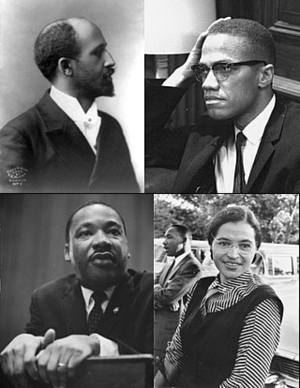 Image via Wikipedia
Image via Wikipedia A Difference in Leadership
The Civil Rights and Tea Party movements
“Behold this dreamer cometh. Come now, and let us slay him and we shall see what will become of his dreams” – Genesis 37:19
As the young Dr. Martin Luther King Jr. walked towards the Holt Street Baptist Church on the evening of December 5, 1955, he had no idea what to expect. A local seamstress named Rosa Parks had just been arrested for refusing to give up her seat to a white passenger, thus violating the Montgomery, Alabama bus segregation laws. While this was not the first case of such civil disobedience, it was the one upon which the local black activists had decided to make a stand. What would soon be known to the world as the Montgomery Bus Boycott got its start at a mass meeting with Dr. King chosen to be one of its primary organizers and speakers.
King left his wife and new-born daughter and hurried over to the gathering with an old college chum. They was amazed to find the Holt Street church overflowing with and surrounded by nearly 10,000 people who created a massive traffic jam several blocks long. In one of the greatest understatements in American history, King turned to his friend and observed, “You know something, Finley, this could turn into something big”.
Such an outcome was not a foregone conclusion. The South of the 1950’s was still a dangerous place for African-Americans who challenged the white power structure and King and his cohorts were planning to do just that. Unless the black population stood behind them, their movement could peter out and they would suffer the consequences. Lynching; remorseless and unpunished, was still a common occurrence.
Standing at the podium, Reverend King started his speech slowly, searching for the correct language, using all the elocution skills that his profession excelled at. Stating the reason for the assembly and its obvious unfairness, his logic was agreeable but failed to yield any visible emotions. The crowd waited, measuring both King and his message. He continued, stating with growing passion, “And you know, my friends, there comes a time when people get tired of being trampled over by the iron feet of oppression…..”
King barely finished as the rest of his soliloquy was lost in a volcanic explosion of cheers, foot stomping and applause that rocked the church to its foundations. It was an abrupt unleashing of all the anger, sorrow, frustration and resolve, accumulated over the centuries and finally given full voice. From that moment on, there would be no turning back. The thunderous response King ignited was the true beginning of the American Civil Rights movement and it launched the process that would culminate 53 years later with the election of Barack Obama to the office of the presidency.
Revolutions born in blood and rage are nothing new in world history. Bastilles fall, leaders are overthrown, and the opponents of each new regime disappear into some far-off wilderness Gulag. What made the Civil Rights saga unique was its dedication to non-violence, particularly what King himself described as the Christian principles of love, moral courage and justice.
Over the past year, pundits on the Conservative Right have tried to label the Tea Party insurgency as another civil rights movement, going so far as to schedule their own march on Washington D. C. on the anniversary of King’s legendary 1963 “I Have a Dream” rally. Both crusades were born from popular anger, they argue, and both are the result of a groundswell against oppressive tyranny.
Not quite.
While originally proclaiming its populist roots, the Tea Party has since revealed its true colors, namely as a mouthpiece for the extreme right-wing of the Republican Party and one that seems determined to bring out the reactionary worst in the American people. Far from exemplifying equality, Tea Party Nation is about saving nickels. As one party stalwart recently expressed to me, “I’ll be damned if the government is going to take my money and give it to the homeless!” God forbid. Tax breaks for billionaires, on the other hand, seem to be just fine.
And “oppressive tyranny”? According to the Tea Party, we are suffering such by being forced to buy health insurance. That’s it. And maybe such a definition makes sense in the alternate universe that their supporters inhabit. After all, what could be more tyrannical than a government interfering with your finances. In the real world, however, oppressive tyranny has a more sinister connotation. It means that security forces come to your house in the wee hours and haul your family off to some secretive dungeon, There, they torture your wife and children and eventually murder all of you, after which they deposit the bodies at the local garbage dump as a warning to others. All because you dared express differing politics.
In the United States for too many years, tyranny translated as denying citizenship and basic human rights to a significant portion of the population. That Dr. King could right such grievous wrongs while refusing to hate, places him light-years ahead of the mean-spirited, divisive and manipulative “leaders” of the Tea Party movement who would take American back to a time when injustice was not only the law of the land but considered the birthright of a corrupt and selfish status quo. Fortunately, the igniting of that emotional spark in 1955 which propelled the Civil Rights era to glory was rooted in the purest of American principles. During the coming years, it will be up to the citizens of this nation to decide whether they will uphold those same ideals or give in to shameless, fearful, and ultimately dangerous, demagoguery.
Dan Brown lives in Greenfield Massachusetts. This was first printed in the Recorder.
Dan Brown lives in Greenfield Massachusetts. This was first printed in the Recorder.

No comments:
Post a Comment